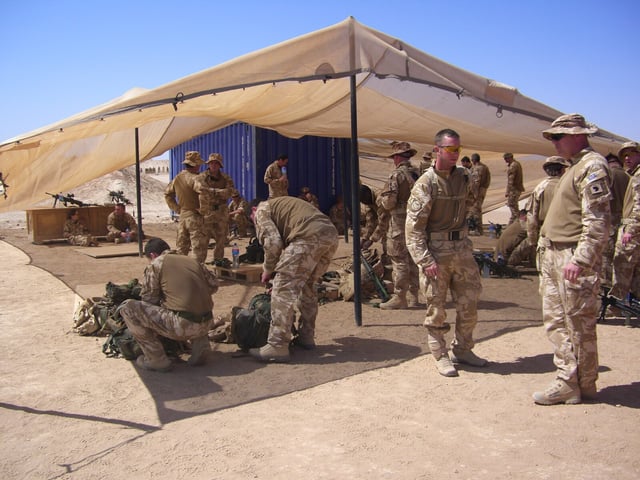
What Is a Good ASVAB Score?
Did you know that 900,000 students take the ASVAB every single year? If you’re thinking about taking the ASVAB, you need to find a way to stand out.
After all, your ASVAB score represents how well you stack up to the competition.
But, your score can tell you more than your percentile rank. There are multiple scores within one test, and each one is important.
Joining the military may seem intimidating, but it isn’t impossible. Just keep reading to learn more before you start taking the ASVAB test.
What is the ASVAB?
The ASVAB is the Armed Services Vocational Aptitude Battery. It’s a timed test that evaluates multiple skills.
The Department of Defense developed the ASVAB to evaluate how and where future servicemen and women could join the service.
Your performance on this exam determines what branch of the service you may qualify for. And, it will provide the types of military jobs you’d be best suited for after basic training.
The better your score is, the broader your options in the military will be.
How Is the ASVAB Test Scored?
The ASVAB doesn’t provide a single score. Instead, there are three different scores to consider:
-
Standard Score
-
Composite Score
-
AFQT Score
Each one of these scores will provide information about your aptitude level in different ways, so you should view each score independently of the others.
1. Standard Score
Upon completing the ASVAB, you’ll receive nine different standard scores. This may seem overwhelming, but these numbers tell you how you did in each of the ten subtests within the ASVAB.
There are nine scores for ten subtests because the Auto Information and Shop Information sections are combined into one standard score.
-
General Science (GS)
-
Arithmetic Reasoning (AR)
-
Word Knowledge (WK)
-
Paragraph Comprehension (PC)
-
Mathematics Knowledge (MK)
-
Electronics Information (EI)
-
Auto and Shop Information (AS)
-
Mechanical Comprehension (MC)
-
Assembling Objects (AO)
Each of the standard scores that you get will fall between 0 and 100. This scale sets 50 as the mean, or average, of the scores. Every range of ten points from the mean represents one standard deviation.
Given this information, anything above a 50 is greater than the average. Because of the distribution, most students fall around the average, between 30 and 70.
The subtest scores themselves don’t tell you much other than how you performed in specific sections. However, you can combine the scores in different ways to make composite scores.
2. Composite Score
Composite scores are also known as line scores. These scores represent various combinations of your subtest scores.
Your composite score is the main indicator when it comes to future job success. Each military branch defines the most important skills for various specialties. Using each list of skills, the Department of Defense creates composite scores for each branch and specialty.
Below are the considerations for each specialty according to branch:
Air Force
-
Mechanical - AR, VE, MC, AS
-
Administrative - VE, MK
-
General - VE, AR
-
Electronic - AR, MK, EI, GS
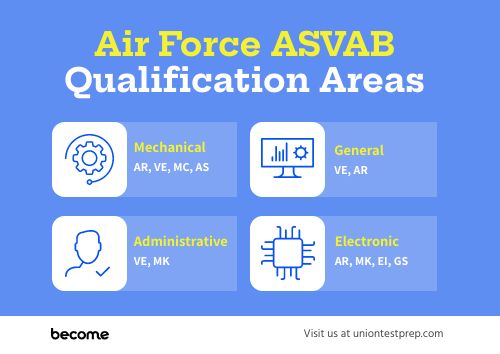
Army
-
General - AR, VE
-
All Other Positions - Consider all standard scores
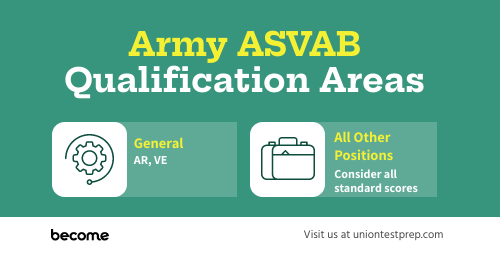
Marine Corps
-
Mechanical - AR, MC, AS, EI
-
Clerical - VE, MK
-
General Technician - VE, AR, MC
-
Electrical - AR, MK, EI, GS
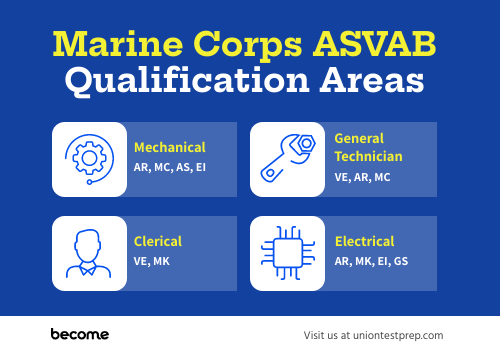
Navy
-
General Technician - VE, AR
-
Electronics - GS, AR, MK, EI
-
Engineering - AS, MK
-
Mechanical 1 - AR, AS, MC
-
Mechanical 2 - AR, MC, AO
-
Nuclear - VE, AR, MK, MC
-
Operations - VE, AR, MK, AO
-
Hospitalman - VE, GS, MK
-
Administrative - VE, MK
Note: VE stands for Verbal Expression. This is a combination of the WK and PC skills as noted previously.
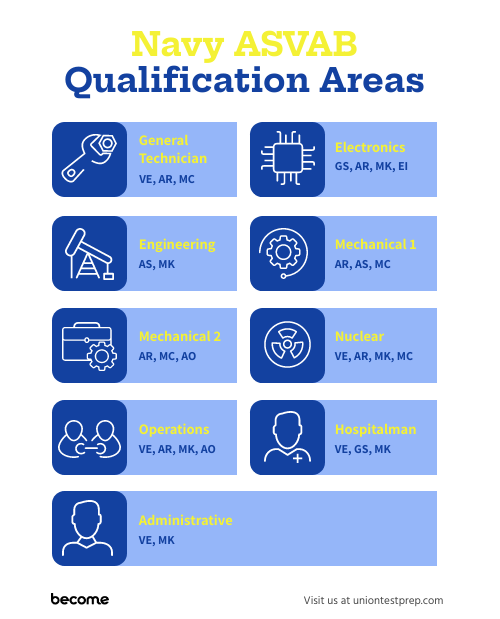
If you’re considering a specific job within a certain branch, you should evaluate how you want to study for the ASVAB. There may be specific sections that you need to focus on before taking the exam.
3. AFQT Score
AFQT stands for Armed Forces Qualification Test. Your AFQT score is the most important score that you’ll get after taking the ASVAB.
This is the score that determines whether you’ll be able to enlist.
Your AFQT score is a combination of the following subtest scores:
-
Arithmetic Reasoning
-
Mathematics Knowledge
-
Paragraph Comprehension
-
Word Knowledge
The AFQT score ranges from 1 to 99 and is based on a percentile rank. In other words, it’ll tell you how you scored in comparison to others who took the exam.
For example, let’s say that you got an AFQT score of 62%. This means that you scored better than 62% of test-takers.
The higher your percentile, the better. You’ll be more likely to qualify for enlistment and more likely to succeed in related fields.
Your AFQT score will also divide test-takers into categories based on their percentile rank:
-
Category I: 93-99
-
Category II: 65-92
-
Category IIIA: 50-64
-
Category IIIB: 31-49
-
Category IVA: 21-30
-
Category IVB: 16-20
-
Category IVC: 10-15
-
Category V: 1-9
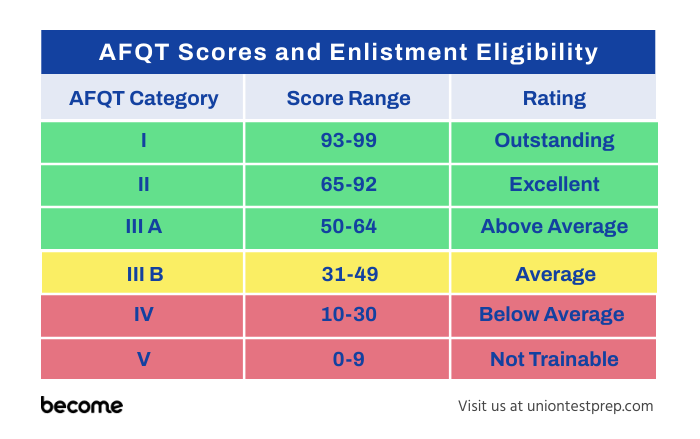
There are no official pass/fail criteria for the ASVAB. But, you should keep the minimum enlistment score in mind for the branches that you’re considering.
Each branch has its own minimum requirements when it comes to this exam. We’ll explain those scores next.
What ASVAB Score Do You Need to Enlist?
Before test day, you should have a general idea of the AFQT score that you need to enlist.
You may be worried about getting a “good” ASVAB score. But, a “good” score is the score that you need to get in, nothing more.
There isn’t a special prize for going above the minimum. However, you should consider the type of career you want to have after choosing your branch. (We discussed those earlier with standard scores.)
The minimum score that you need for each branch will depend on whether you have a high school diploma or a GED. Those with a GED will need a higher score on the ASVAB to enlist.
Here are the minimum AFQT scores to consider for each branch:
Air Force
-
Diploma Minimum: 36
-
GED Minimum: 65
Army
-
Diploma Minimum: 31
-
GED Minimum: 50
Coast Guard
-
Diploma Minimum: 36
-
GED Minimum: 47
Marine Corps
-
Diploma Minimum: 31
-
GED Minimum: 50
Navy
-
Diploma Minimum: 35
-
GED Minimum: 50
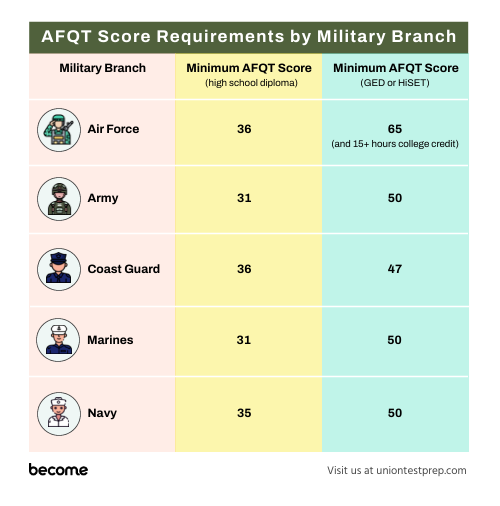
When you’re preparing for the exam, you should keep your relative minimum in mind.
Remember, each one of these scores is a percentile. How you score on the test will depend on how others score.
Your “good” ASVAB score is the minimum score that you need to enlist in the branch you’re interested in.
How Can I Improve My ASVAB Score?
Now that you know everything about ASVAB scoring and minimum requirements, it’s time to get to the nitty-gritty. If you want to enlist, you have to get a high enough AFQT score.
Luckily, there are a few things that you can do to study before test day.
1. Focus on Your AFQT Score
Your AFQT score is the number that determines your eligibility for military enlistment. This is the most important score that you’ll receive after taking the ASVAB.
In order to raise your AFQT score, you’ll need to focus on studying for these four sections:
-
Arithmetic Reasoning
-
Mathematics Knowledge
-
Paragraph Comprehension
-
Word Knowledge
Your study schedule should allot time to all of the sections. But, these are the main four that you want to solidify before test day.
2. Use ASVAB Practice Tests
The best way to study for any test is by doing practice questions. ASVAB practice tests will give you questions similar to the test to learn from.
These questions will help you get a clearer idea of what you might run into while you’re taking the exam. As you’re looking through these questions, you should consider how they worded the questions and what kind of content they’re testing you on.
3. Make a Study Schedule
No productive studying can happen without a study schedule. The ASVAB isn’t a test that you can cram for the night before.
You have to have a planned study schedule if you’re going to cover all of the content you need to before the exam.
We recommend that you start studying for the exam about two months in advance. This should give you the time that you need to hone your math and verbal skills while covering the other sections of the exam.
During this time, you should focus on understanding question formatting and important content. ASVAB study guides can help direct your focus as you are trying to learn.
You should also make time for ASVAB practice exams. You should take at least three practice exams: one before starting your study plan, one in the middle of your study plan, and one before taking the exam.
You may also want to consider purchasing ASVAB prep books or ASVAB studying programs. These can help you run through the content with a little more guidance and direction.
4. Admit Your Weaknesses
Weaknesses are a hard thing to think about. As you’re studying for the exam, you might be holding onto the things that you’re good at.
However, admitting your weaknesses can help you become stronger in those weak areas. If you know what you’re bad at, you can spend more time studying and reviewing that topic. Then, you’re likely to do better on the exam.
If your weaknesses include language skills and/or math, you need to make up the difference with more study time and extra practice.
As you’re going through the content and reviewing questions, you should make notes. Write down the content that you find difficult to understand. And, make note of the practice questions you miss.
ASVAB Frequently Asked Questions (FAQ)
Over the years, we’ve heard a lot of the same questions about the ASVAB. If you still have some questions, you may find the answers here.
What Are ASVAB Scores?
Like other exams, the ASVAB provides a score after you complete it. This score is an indicator of your performance in math, science, English, mechanics, and electronics. The ASVAB is not an IQ test. Rather, it intends to look at your strengths and weaknesses in order to gauge your success in the armed forces.
What Are ASVAB Scores Used For?
ASVAB scores are used in a variety of ways.
It’s likely that your high school (or a high school near you) administered the ASVAB while you were there.
High school guidance counselors can use this information to help you determine a great future career path, whether you decide to join the military or not. The results can tell you what kind of careers you should consider for the future.
This can help you decide whether you want to go to college, vocational school, or technical school. Alternatively, you could go straight into enlistment.
If you do decide to enlist, your ASVAB scores can help determine your best placement within the military. Based on your scores, you may succeed in different careers within different branches.
What Is the Highest Possible ASVAB Score?
It depends on what version of the ASVAB you take.
The paper form of the exam has a high total of 225. The computerized version of the exam has a high total of 145.
However, this is not the AFQT total. That ranges from 1 to 99 based on your percentile among other test-takers.
How Many Times Can You Take the ASVAB?
If you aren’t happy with your score on the ASVAB, you can take it up to two more times. However, you have to wait at least one month between the first and second attempts. If you decide to take it a third time, you have to wait six months between the second and third attempts.
How Long Are ASVAB Scores Good For?
Your ASVAB scores are good for two years. After that time passes, you’d need to retake the exam for enlistment.
If you’d like to take a little bit of time off between high school and enlisting, you can do so and still keep your ASVAB score.
Get Ready to Take the ASVAB
The ASVAB isn’t as intimidating as it may seem. However, you should take the time to prepare so that you can perform well the first time around.
Your ASVAB score could open doors for you.
To start preparing, check out our ASVAB study materials. We have everything you need to study for and succeed on the ASVAB.
Keep Reading

Armed Services Vocational Aptitude Battery Blog
What is the ASVAB Test?
The Armed Services Vocational Aptitude Battery, known as the ASVAB, is …
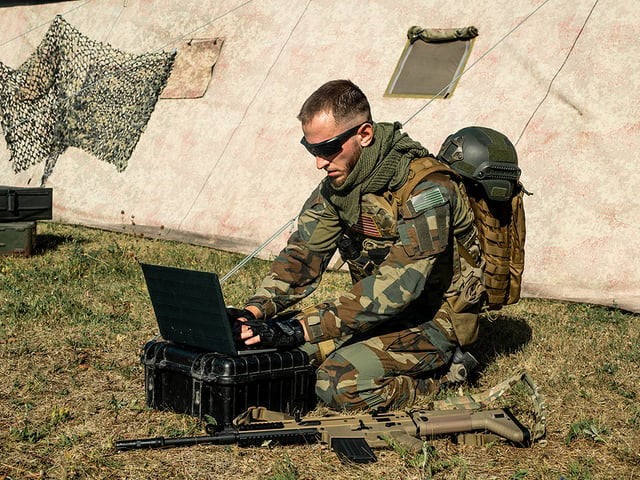
Armed Services Vocational Aptitude Battery Blog
Military MOS Codes
Military Occupational Specialty (MOS) codes are an integral part of the…

Armed Services Vocational Aptitude Battery Blog
U.S. Army Height and Weight Standards for Females
The U.S. Army’s commitment to maintaining a robust, physically fit, and…